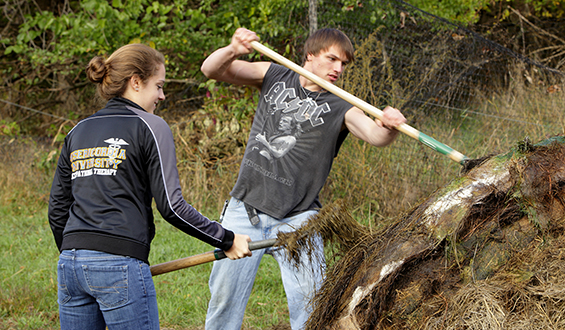
JACKSON TWP., Pa. – The crisp fall morning does little to deter Brandon Dewey, 17, of Dallas from preparing a portion of the Dream Green Farm Program’s farmland at the Lands at Hillside Farms for planting its most popular crop – garlic. Dressed in a short-sleeved pocket T-shirt, the Luzerne Intermediate Unit 18 (LIU-18) student carefully follows a string-lined path to punch small holes in the earth with a long garden tool handle. Fellow LIU 18 student Josh Lockavich of Luzerne follows closely behind, planting the varietal bulbs in the holes, some eight-inches apart, and covering them with loose soil.
It is planting season – at least for the Music, Inchelium red, German red and Polish Softneck garlic crops – and the 10 LIU 18 students who plant, harvest and sell the produce in support of the Dream Green Farm Program, a transitional vocational training internship that offers work skills to students with learning needs. Housed on the 412-acre Lands at Hillside Farms, the collaborative program features about two dedicated acres of farmland, a general education building, storage shed, and an assortment of equipment.
“It’s a learning experience,’’ Dewey acknowledges, while taking a short break. “It’s pretty fun, also. Our boss teaches us a vocabulary word of the day. We have to learn things like planting and tilling. There are so many other things to do here. We learn people skills when we are down there (at the Wilkes-Barre Farmers Market). Math is a good idea, because you have to count the cash and give people their change.’’
The Dream Green Farm Program was born in 2009 with the assistance of a $99,000 United States Department of Agriculture grant. The program between Lands at Hillside Farms and LIU 18 has grown from a start-up to a self-sustaining operation that also provides assistance to operations at the nonprofit landmark in the Back Mountain.
On this day, the students prep and plant the last section of the garden for garlic. A blanket of hay already covers the bulbs that were planted earlier in the week. Before the full onset of winter, the students and the Dream Green Program manager and job coaches will till over the rest of the garden and plant winter rye as a cover crop to protect nutrients in the field. Many of the crops they will plant in spring will be grown from seed during the winter in the greenhouses on the historic farm. Those seedlings become tomatoes, peppers, squash, cucumbers, strawberries, leaf lettuce, pumpkins, flowers and more in early summer.
“The students that attend Hillside love talking about the program,’’ says Allison Hausman ’17, O.T.S., Lancaster, Pa., a Misericordia occupational therapy student who is studying the program. “They’re all very excited to be there and they actually do have an interest in farming and what they are doing there.’’
In between the planting and harvesting of their crops, the students and mentors treat the experience as a real-life working farm where students grow an agriculture-based skill set, while also developing people and other important life skills, such as entrepreneurial, mathematical, physical and mechanical. They tend to the fields and garden crops in season, but they also split fire wood to heat the greenhouses, care for farm animals, complete routine maintenance on power equipment, and seek alternative means of making money to sustain the farm during the winter. That diversification has led to growing sales for their holiday pine and spruce wreaths that come complete with berries and bows, Christmas cactus plants and dried flower arrangements. The students also receive a stipend for their hard work, which adds another layer of accomplishment, according to Brian Novicki, LIU 18’s transitional coordinator.
The program, though, is more than simply caring, nurturing and cultivating crops. It’s about “helping young people adjust from the school system to whatever comes next,’’ Novicki says. “There’s a multitude of things happening here. It’s a good feeling to see their excitement and growth. The rewards are the thank-yous from the students or when they tell you they love it here. We are pleased with what we have. Our relationship with Lands and Hillside Farms is great.’’
About 30 young adults 16 to 21 years of age have participated in the program since its inception. The Department of Occupational Therapy at Misericordia University added the program as a pediatric fieldwork experience for juniors in the program last spring. The relationship between the program participants, LIU 18, Lands at Hillside Farms and the University expanded in the fall with the start of the two-year, faculty-student research study, “Effectiveness of a Transitional Agricultural Training Program for Adolescents with Autism and Developmental Disabilities Based on Outcome Measures.’’
“We will measure the vocational program outcomes for students with special needs as they transition into adulthood,’’ says Jennifer Dessoye, O.T.D., O.T.R./L., assistant professor of occupational therapy at Misericordia University, “and to understand if this program increases skills needed to be employable after the students graduate from high school at 21.’’
Misericordia University occupational therapy majors are required to conduct research as part of the five-year academic program’s curriculum. The six students involved in the study voluntarily chose to study the novel program for their own individual reasons. For Erin Huff ’17, O.T.S., Sugarloaf, Pa., it was both personal and professional, as the Hazleton Area High School graduate was influenced by Dr. Dessoye’s past research, “The Effectiveness of iPad Handwriting Applications on Improving Visual Motor and Handwriting Skills in Children with Autism Spectrum Disorder,” and her older brother, Zach, 27, who has Down syndrome.
“I have a brother with special needs who is not at that level of function, but his peers could have benefited from a program like this,’’ says the daughter of Kim and Gary Huff. “Growing up with a brother with special needs has made me never look at them differently. Seeing the impact his different services, such as occupational therapy, had on – not just him but my whole family – was what made me choose this profession.
“This profession means a lot to me,’’ Huff adds.
Student researchers developed and presented the application for the Institutional Review Board (IRB) at Misericordia with assistance from Dr. Dessoye, the faculty research advisor. Once approved, the students began gathering data in September. The five data collection points with students will be completed in September 2016. It will take an additional nine to 12 months for the entry-level master’s degree program students Alyssa Auer ’17, , O.T.S., Scranton, Pa.; Fallon Cooper ’17, O.T.S., Freeland, Pa.; Meghan DiGerolamo ’17, O.T.S., Budd Lake, N.J.; Quinn Fohlinger ’17, O.T.S., Wayne, N.J.; Hausman and Huff to analyze the information, which is using a set of qualitative (observations and interviews) and quantitative (standardized assessments using Texas Functional Living Scale, Beery Test of Visual Motor Integration and Allen Cognitive Levels) outcome measures.
The research, which is being completed on-site, is being conducted to measure the effectiveness of the transitional program and its efficacy to further the development of transitional programs for people with physical, emotional and developmental disabilities, according to the IRB.
“If the outcome measures resemble these expectations, the effectiveness of the program will be validated and evidence-based,’’ says the daughter of David and Janice Hausman, a Conestoga Valley High School graduate. “It will justify this program and others like it as suitable for more state funding. Improvements can then be made to the program based on the study’s findings to further benefit the students in the program and the development of the functional capabilities in the target areas.’’
“A positive outcome would be creating an array of programs similar to the Dream Green Program across our region and nationally,’’ adds Dr. Dessoye, “to allow other students with special needs to access the clear benefits of a horticultural transitional program.’’
Farming Program Offers Transitional Vocational Experience With Help From Misericordia
0
Share.




